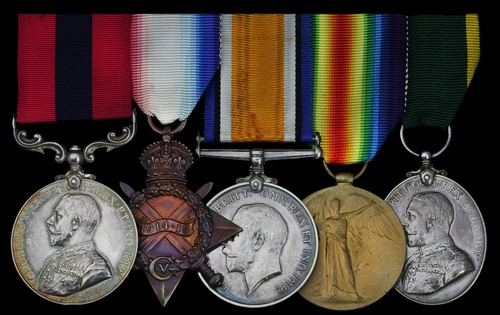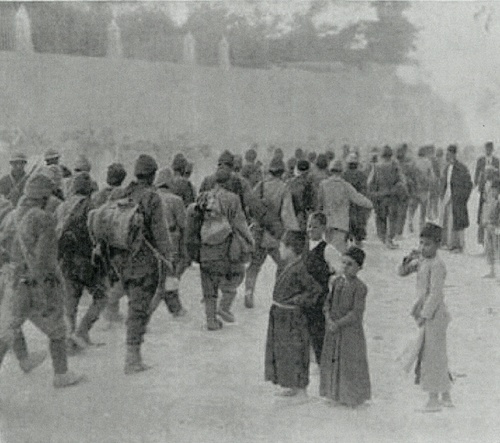Auction: 19001 - Orders, Decorations and Medals
Lot: 489
A Great War Palestine operations D.C.M. group of five awarded to Staff Sergeant W. Morcombe, 1/2nd Welsh Field Ambulance, R.A.M.C., for his gallantry in the night attack at Nablus on 18 September 1918
Distinguished Conduct Medal, G.V.R. (366065 S. Sjt. W. Morcombe, R.A.M.C.); 1914-15 Star (1672 Pte. W. Morcombe, R.A.M.C.); British War and Victory Medals (1672 S. Sjt. W. Morcombe, R.A.M.C.); Territorial Efficiency Medal, G.V.R. (7335581 Sjt. W. Morcombe, R.A.M.C.), generally good very fine (5)
D.C.M. London Gazette 11 March 1920:
'On the night of 18-19 September 1918, he displayed conspicuous gallantry while in charge of stretcher bearers. He has invariably done exceedingly good work and showed great coolness and devotion to duty under fire.'
William Morcombe arrived in Egypt on 19 July 1915. A member of 1/2nd Welsh Field Ambulance, his unit was a component of 53rd (Welsh) Division and quickly saw action in Gallipoli.
Nablus
The battle of Nablus commenced on 18 September 1918, when the Division attempted to seize the Samieh basin overlooking the Ottoman road system behind their front lines. The attack began shortly after 1830 hours, when three battalions of the 160th Brigade, with the 21st Punjabis as vanguard, moved down into Wadi es Samieh in a wide flanking manoeuvre across rocky terrain towards the rear of the Ottoman positions. After cresting the wadi, they turned to the left and attacked a series of Ottoman positions from the east, capturing small posts until an artillery bombardment enabled them to continue their advance.
At 2230 hours, the 159th Brigade began its advance but almost immediately encountered strong Ottoman defences and the only five Hindustani-speaking British officers were wounded. Despite the casualties, the Brigade captured its objectives under the command of an Adjutant Captain. The 159th Brigade advanced again and captured the Hindhead position at 0440 after a red rocket from the 160th Brigade - indicating it had captured most of their objectives - was sighted. Meanwhile, the 160th Brigade had met increasing machine-gun and artillery fire until a five-minute artillery bombardment at 0445 enabled the capture of the Square Hill position. The southern end of Nairn Ridge was not captured, having 'withstood three assaults'.
At 0430, intense bombardment by artillery and trench mortars, supported by machine-gun fire, targeted the German and Ottoman front and second line trenches ahead of XXI Corps, towards the Mediterranean coast. Additional fire support came from three siege batteries, which provided counter-battery fire, and the destroyers H.M.S. Druid and H.M.S. Forester, which fired on Ottoman trenches north of the Nahr el Faliq.
Nairn Ridge remained in Ottoman hands until about 1900 hours on 19 September, when it was finally captured and the road works could begin, and 53rd (Welsh) Division could start its attempt to block the line of retreat, to the Jordan River at Mafid Jozele.
It was in these circumstances that Morcombe - who had charge of 1/2nd Welsh Field Ambulance's stretcher bearers - won his D.C.M. He was discharged in June 1919.
Subject to 20% VAT on Buyer’s Premium. For more information please view Terms and Conditions for Buyers.
Sold for
£950







